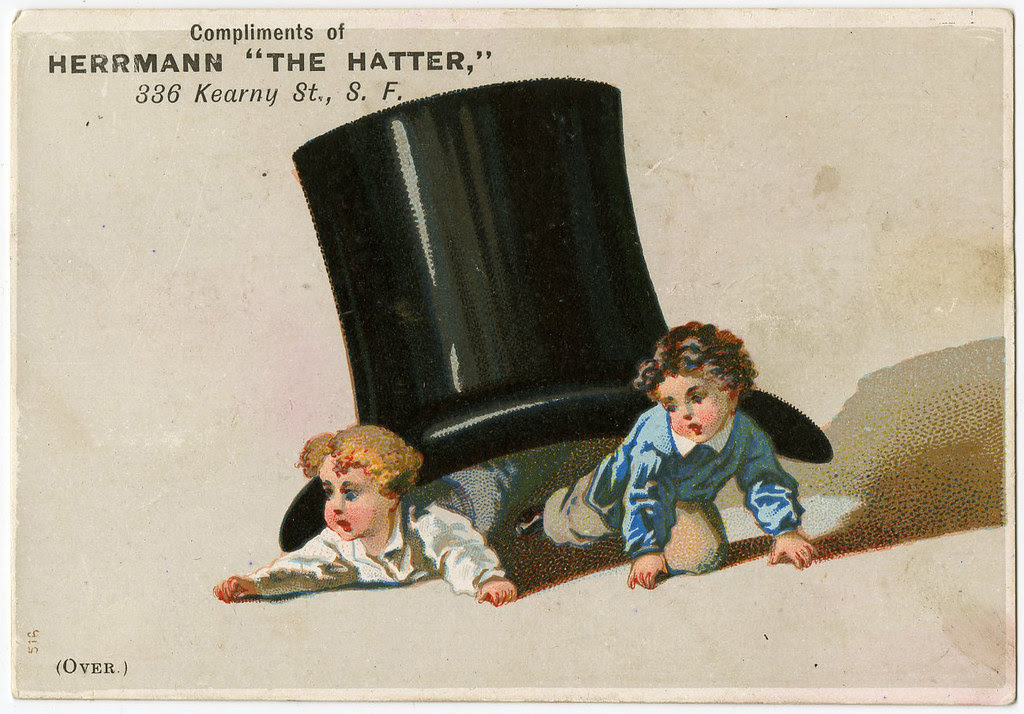.
Advertisement for the Pacific Coast Trunk Store: artist unknown, n.d. (California Business Ephemera Collection, California Historical Society)
Pack my trunk
with a whole lot of junk
I don't really need
in a life boat
and sink it in the ocean
without a note
said the tyke
who a minute before
had crept out
who a minute before
had crept out
with a great sense of adventure

Trade card of C. Herrmann and Company, San Francisco: artist unknown, n.d. (California Business Ephemera Collection, California Historical Society)

Your poem reminds me of the Riddle of the Sphinx, somehow, as it encapsulates an entire life, and the word "tyke" placed there puts it all in aging and divesting perspective. A miniature marvel.
ReplyDelete_________
Here's a poem among the last by Mexican poet, Marco Antonio Montes de Oca, that I've tried to translate (Spanish version on request):
THE TALE OF THREE SUITCASES
I arrive with my suitcase full of masks
Among smoke rings
And halo necklaces
Stolen mostly from angels.
I turn corners where I’ll bump into
A hidden spy
At the very spot where air gets tattooed,
Held still
By its chain of butterflies.
I come with another suitcase
Full of torrential whiteness
Where the coffer moon
Gathers up its silver,
Its agile mirages and mystified illusions
Born at the moment a mirror’s front
touches its black back.
My last suitcase
Comes filled with pollen for the dawn:
Bursts open in the middle of the road
And the sun pales with envy —
But no one finds out about
The violent sadness
Of a silenced star.
Many thanks esteemed brother for revealing to me some hints as to the meaning of the insoluble riddle which I now see embedded here. One spends a lifetime investing in this and that, a long series of minor investments which in the end accrue about as much of substance as a handful of dust, once the palm has opened to release it to the winds. That opening of the palm comes finally to seem at once more delicate, more difficult, and more fraught than the whole chain of temporary investments, which in retrospect come to look like so many ways around facing the ultimate meaning of the riddle -- that desire is built into us as creatures, yet nothing worth desiring can ever be grasped... and everything we get our greedy little hands on, or don't but think we want to, turns out to be/have been just a lot of junk.
ReplyDeleteAnd somewhere out there in the silence and darkness beyond the lifeboat, those echoes we hear -- siren songs, unearthly laughter?
encapsulates an entire life
ReplyDeletea miniature marvel
I agree. Lying in bed last night I was thinking about packing a suitcase for next week and also about things already packed up in my house and considering the whole "why do we keep things" question.
Needless to say, I tossed and turned and woke up exhausted and unsatisfied.
Curtis
Curtis,
ReplyDeleteThe past year has been for me a punishing instruction in human need.
The things I once thought I needed having gradually drifted out of reach, and with each such recession, the sense of unnecessary baggage having accumulated proportionately, I now find that what I most wish for is to simplify things where at all possible, to be relatively free of pain, and to get a bit of sound, peaceful sleep -- objectives which seem all the more desirable for being out of reach.
A tyke with no more sense of adventure, and no way to crawl back under that hat.
The word "dunya" (this world) in Arabic, and in the Qur'an is mentioned as opposed to "achira" (the next world), actually has as its root a word that means "hanging just out of reach." So incessantly running after it can be frustrating... built in.
ReplyDeleteAbdal-Hayy,
ReplyDeleteYes. Built in. Even when we can't run after it any more -- still limping, groaning, grabbing at phantoms in the dark, missing every boat, every train, every bus, stupidly refusing to give up... and where did I put that damn cigar-cutter, anyway?
Is the next world built into this world, though, or did it turn out this world was that next boat we always missed?
Like the poem, Tom.
ReplyDeleteThanks, Curtis.
ReplyDelete